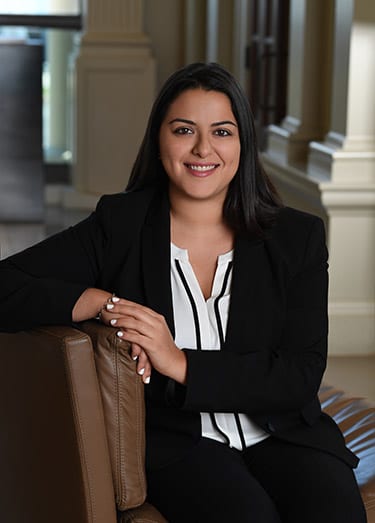
In Safa Ansari-Bayegan’s freshman political science class at the University of Houston, she read about a Texas prisoner who was executed—even though research showed ample reason to further investigate the science used to convict him.
“That opened my eyes to our criminal justice system, the appeals process, and what groups badly need quality representation,” she says.
Soon after, as an intern at the Texas Defender Service, Ansari-Bayegan made her first visit to a prison and met with two men on death row. Before her next visit with two different clients, she looked up the crimes for which they had been convicted.
“I was curious how that might affect my interactions with them—and it was really hard to reconcile the men I was talking to with what they’d allegedly done,” she says. “It made me appreciate the ability of people to really change over time, and helped me realize how important it was to humanize these individuals.”
Ever since, Ansari-Bayegan has charged toward a career in indigent criminal defense, earning several awards and accolades along the way. This fall, she will give her efforts a huge boost as an E. Barrett Prettyman Fellow.
Given to just three graduating law students from hundreds of applicants, the coveted two-year LL.M. fellowship at Georgetown Law develops committed indigent defense counsel through rigorous training in criminal trial advocacy and clinical teaching. Ansari-Bayegan will receive stipends totaling $117,000, with full benefits, tuition, and fees.
“My amazing clinical experiences at Berkeley Law made this possible,” she says.
At the Death Penalty Clinic, she drafted major portions of a state habeas brief on behalf of an Alabama death row client. At the East Bay Community Law Center, she represented youth caught at the intersection of the juvenile justice and education systems in special education administrative hearings, school discipline proceedings, and juvenile case record-sealing.
A mitigation specialist in West Texas before law school, Ansari-Bayegan was part of a legal defense team representing indigent clients who faced capital charges. She helped create narratives that humanized her clients before the given district attorney or jury, and she promoted that framework at Berkeley Law, co-organizing a popular conference on participatory defense.
“I loved doing the work and felt really connected to the clients and their families,” she says. “But I also felt limited in what I could do without a law degree. I wanted to be the one standing next to them and fighting for them in a courtroom.”
